Over the 3 days immediately after the Lunar New Year, I was on vacation leave. (Apply for 3 days' leave and get 9 days' rest - why not eh? Besides I still have unconsumed leave from last year and I also needed a well-deserved break badly.) Other than the usual
chores duties of chauffeuring wife and children to/from work and school respectively, I was free to do whatever I please. Blogging being my new-found
assignment passion, I roamed around town, hoping to get inspiration for my subsequent posts. I took a lot of photos and got plenty of inspiration, some of which were definitely not of the type that I desired. I learnt from first-hand experience that there were some perils in blogging which I was hitherto unaware of. I would like to share my experience with all of you so that you would not repeat the same mistakes that I made. Some of these mistakes were not obvious to me until after I have made them.
I am not talking about controversial blogging contents here. We all know that there are OB (out-of-bounds) markers and unwritten rules even in blogosphere, especially after 3 racist bloggers were charged recently. Don't ever think that you can hide behind a nick and that 'the powers that be' can't track you down if they want to.
Any topic that has the potential to cause racial or religious disharmony is a no-no. Taboo too are:
1. State secrets (please see
Miyagi's article);
2. Pornography (no link provided since everyone who wants one would know where to get it);
3. Inciting of violence;
4. Issuing of threats; and
5. Passing slanderous/defamatory remarks. Vulgar language included.
Topics like politics and government policies, if ever discussed, should be handled carefully, rationally and objectively. You should be able to stand up to your comments if you were ever asked to. Remember the
Dr Catherine Lim case in 1994?
Another likely peril - if you spend too much time blogging, your relationship with your loved ones may suffer. Imagine what kind of sex life can there be when you blog into the early hours of each and everyday? And when you do not sleep well, your study or work will be affected. Ultimately your health may be affected too.
I found out recently that there is yet another potential danger in blogging - it could be hazardous to my health (in another way) and wealth too. How could this be, you may wonder. (That's why I said in the first paragraph that it was not obvious.) You see, I like to include photos in my blog. It makes my blog more interesting for the reader. As they say, 'a picture paints a thousand words'. Now, it would be alright if I just took photos of inanimate objects even though they might look deceivingly animate:
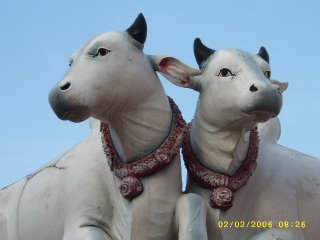
Some would even have a ready smile for the camera:

Even animate subjects are alright so long as they don't know how to complain (and don't give you bird flu):
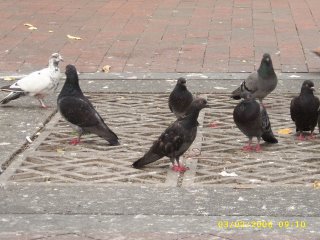
On 2 Feb 06 (正月初五) I was at Mohamad Ali Lane which is near Club Street where Chris grew up. I was there to find out if activities similar to those in
Sungei Road were being carried out there. I was standing about 15 feet away from this lone amicable-looking old man. He was fiddling with an old stereo set. Besides him was a cart with lots of other
rubbish old items, presumably to be used for
conning gullible people sale to interested buyers. 'Ahh, what an ideal photo for my blog!', I thought to myself. Immediately and instinctively, I drew out my
equipment camera and aimed it at the man. In my haste to capture the moment, I forgot to turn off the flash. Immediately after the flash fired, the man looked up, got up and swaggered menacingly towards me. Below is the dialogue that followed as faithfully as I recall it. It has been translated into English from Hokkien.
Warning, NC13 Rating: The man's portion of the dialogue (below in
blue) is extremely crude and vulgar. In the process, even my ancestors were insulted. I have toned it down by using standard abbreviations. CAPS signify shouting.
Parental guidance strongly advised. (If parents are not around, you may scroll down very quickly to skip the dialogue or quit this page.)
Man: YOU TOOK MY PHOTO IS IT?Me: Er, ya just one for...Man: LIMPEH HATE TO BE SNAPPED AT. I HATE PEOPLE WHO TAKE MY PHOTOS!Me (thinking, 'Me too, why are you snapping at me like that?'): Sorry, sorry.Man: SORRY? HNG, KNN, WHY YOU TOOK MY PHOTO WITHOUT ASKING MY PERMISSION? WHY, WHY?Me (trying to think on my trembling feet): Er... I am a tourist lah, only taking some personal snapshots.Man: KNNCCB, TAKE OUT THE FILM RIGHT NOW!Me: This camera got no film one.Man: NNH, THEN DELETE IT, DESTROY IT RIGHT NOW!Me (pretending to delete the photo but in reality, there's no way I was going to delete a photo which I risked life-and-limb to take): There you are, it has been deleted.Man: CCB, DELETED? WHO ARE YOU KIDDING? I DON'T BELIEVE!!!!.At this point, he started to get aggressive and violent. He gave me a push. By now, there was a small crowd gathering. The crowd was made up of people from the nearby coffeeshop. They all stopped drinking their coffee to watch the show. Fearing for my life and the safety of my camera and its loot, I
turned around and ran for my life beat a hasty retreat. The
beast man ran after me for a while but he soon gave up after realising that he couldn't catch up with this agile monkey who was younger than him. Besides, his personal belongings, i.e. the radio and the cart, were left unguarded.
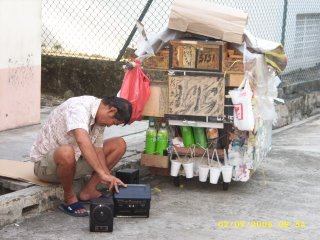
Chris must be laughing now. In Nov 05 when he found out that I took a photo of a young girl toddler without getting her parents' permission, he commented (see my post of 26/11/05) that 'People got beaten up for doing the thing you did, Victor. Don't say I didn't warn ya.' Chris has this uncanny ability to predict events. Maybe I should ask him for some winning 4D numbers.
Now what have I learnt from this incident? No, it is not that I would no longer take candid shots of people for my blog. Neither will I ask them for permission first. The answer? I already have it and have tested it out successfully the very next day. Watch out for Part 2 of this post where I'll also explain how my wealth was affected by this incident.
(To Chun See - This is my first take. Still owe you one more take - to be continued.)
 So you see, I do bring business to the shopping centre, not just window shop and take photos. (Big mistake, Miss Moods shopkeeper!) Sigh, the extent I would go to, just to please a friend, not just to put up a blog. And the extent that a friend would go to, just to take a swipe at me. Some people can be ungrateful. Tsk, tsk, tsk.
So you see, I do bring business to the shopping centre, not just window shop and take photos. (Big mistake, Miss Moods shopkeeper!) Sigh, the extent I would go to, just to please a friend, not just to put up a blog. And the extent that a friend would go to, just to take a swipe at me. Some people can be ungrateful. Tsk, tsk, tsk.
 Immediately after I took the bottom right photo, a shopkeeper came out from the adjacent shop and confronted me. Obviously she
Immediately after I took the bottom right photo, a shopkeeper came out from the adjacent shop and confronted me. Obviously she  Oh, so what I did was considered 'suspicious behaviour'? What was the shopkeeper thinking? Did I look like a txxxxrist who was taking photos with intention to bxxb the place? Even if I were, I wouldn't have chosen a shopping centre so devoid of human traffic, would I? Couldn't I be a potential customer who was only trying out a digital camera on sale there? What's the use of a camera if I can't even take photos of something as inanimate as a closed shop? And if I had always asked the rightful owner for permission to take photos, do you think you will get to see all the interesting photos on my blog? Fat chance okay. What is a camera for anyway? To take family snapshots or make stars of of ourselves in
Oh, so what I did was considered 'suspicious behaviour'? What was the shopkeeper thinking? Did I look like a txxxxrist who was taking photos with intention to bxxb the place? Even if I were, I wouldn't have chosen a shopping centre so devoid of human traffic, would I? Couldn't I be a potential customer who was only trying out a digital camera on sale there? What's the use of a camera if I can't even take photos of something as inanimate as a closed shop? And if I had always asked the rightful owner for permission to take photos, do you think you will get to see all the interesting photos on my blog? Fat chance okay. What is a camera for anyway? To take family snapshots or make stars of of ourselves in 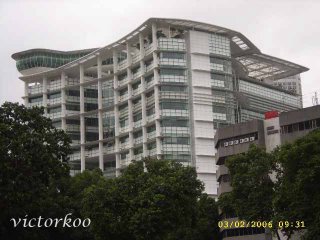
 Every floor of the library had a pair of escalators but most of them did not appear to be working:
Every floor of the library had a pair of escalators but most of them did not appear to be working: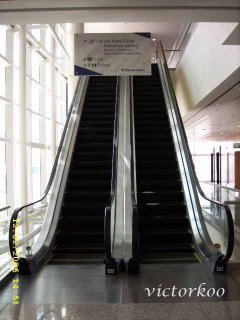
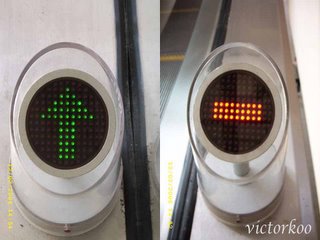 I certainly was not aware that one needed a pass in the highway code in order to use the escalator safely. So paiseh, even though I had passed my highway code some 3 decades ago, I had failed to notice the tiny signs (must be my failing eyesight). If I had fallen and injured myself, I would definitely become the laughing stock of friends like
I certainly was not aware that one needed a pass in the highway code in order to use the escalator safely. So paiseh, even though I had passed my highway code some 3 decades ago, I had failed to notice the tiny signs (must be my failing eyesight). If I had fallen and injured myself, I would definitely become the laughing stock of friends like 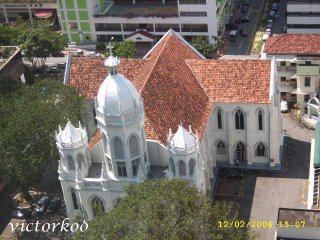 On the day of my visit, the library was a hive of activities. There was even an opera performance at the Plaza which was part of Lovebites 2006, a charity event held in aid of the
On the day of my visit, the library was a hive of activities. There was even an opera performance at the Plaza which was part of Lovebites 2006, a charity event held in aid of the  (
( 2 Dream of the Red Chambers;
2 Dream of the Red Chambers; The personal computer has largely replaced the functions of the typewriter, fountain pen and ink.
The personal computer has largely replaced the functions of the typewriter, fountain pen and ink. At least 5,000 of such bricks were retained from the old building in 2004 and now form part of a wall in the basement garden of the Library at Victoria Street. The bricks were baked at the Alexandra Brickworks factory, with clay from Jurong.
At least 5,000 of such bricks were retained from the old building in 2004 and now form part of a wall in the basement garden of the Library at Victoria Street. The bricks were baked at the Alexandra Brickworks factory, with clay from Jurong.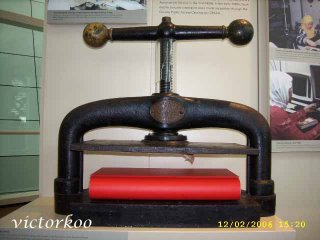 This press was used in the book binding unit located in the basement of the Stamford Road National Library. Library staff were required to repair and strengthen books and periodicals through careful sewing and binding by hand. Notice that the book press was made in London and imported by a Singapore company located in Kling Street:
This press was used in the book binding unit located in the basement of the Stamford Road National Library. Library staff were required to repair and strengthen books and periodicals through careful sewing and binding by hand. Notice that the book press was made in London and imported by a Singapore company located in Kling Street: 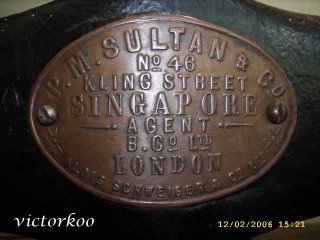 (Extract from
(Extract from 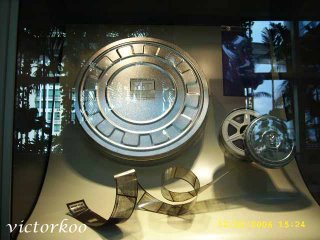 According to the explanatory notes, these technologies appeared in the 1960s and 1980s. Microfilm and microfiche technologies are some of the more stable means of preserving information in today's information age. (No kidding? Can they be more stable than my computer hard disk and CD-Rs which I use to store my data?)
According to the explanatory notes, these technologies appeared in the 1960s and 1980s. Microfilm and microfiche technologies are some of the more stable means of preserving information in today's information age. (No kidding? Can they be more stable than my computer hard disk and CD-Rs which I use to store my data?) But self-service terminals had largely replaced the traditional staff:
But self-service terminals had largely replaced the traditional staff: Even so, my unequivocal verdict was that the new library had a much more pleasant and conducive learning environment compared to the old one. You should visit it soon if you have not done it yet. I am sure that you will find the experience as fulfulling as I did. Do be extra careful when using the escalators though.
Even so, my unequivocal verdict was that the new library had a much more pleasant and conducive learning environment compared to the old one. You should visit it soon if you have not done it yet. I am sure that you will find the experience as fulfulling as I did. Do be extra careful when using the escalators though.  Not only that, I would not incur late payment charges but the usual interest rates would apply. My alarm bells started ringing immediately. Being a responsible and creditworthy credit card holder, I always settled my credit card bills fully via Giro payment. Why should I incur extra interest charges (at an exorbitant 13% p.a.) when I didn't need the payment holiday? What kind of promotion was that when I had to pay more for credit which I did not need? Since the letter did mention that I had a choice (see word circled in red above), I immediately called up their hotline. I was assured by the staff who answered my call that customers on Giro would not be affected by this promotion, i.e. they would still be billed normally for Dec 2005. Despite having called the hotline to opt out of this 'promotion', I was therefore very surprised to receive a Jan 2005 bill which reflected extra (interest) charges of $37.28:
Not only that, I would not incur late payment charges but the usual interest rates would apply. My alarm bells started ringing immediately. Being a responsible and creditworthy credit card holder, I always settled my credit card bills fully via Giro payment. Why should I incur extra interest charges (at an exorbitant 13% p.a.) when I didn't need the payment holiday? What kind of promotion was that when I had to pay more for credit which I did not need? Since the letter did mention that I had a choice (see word circled in red above), I immediately called up their hotline. I was assured by the staff who answered my call that customers on Giro would not be affected by this promotion, i.e. they would still be billed normally for Dec 2005. Despite having called the hotline to opt out of this 'promotion', I was therefore very surprised to receive a Jan 2005 bill which reflected extra (interest) charges of $37.28: I immediately called the hotline again to give the bank
I immediately called the hotline again to give the bank  However to me, the damage had been done. As they say, 'sorry no cure' (especially when it came so late). In fact, this was not the first time that the bank made an error in its dealing with me - a few months ago, the bank deducted my housing loan payment from my savings account instead of from my CPF account which it had been doing regularly. Luckily I checked and called them immediately to rectify the error. Again, the bank said that it was aware of the problem and it had been corrected even before my call. Was that a case of never admitting one's mistake; sorry is the hardest word; just face-saving or all 3-in-1? Then how about those pre-approved credit cards which the banks sent out to creditworthy customers a few years ago? If you did not opt out, then you were automatically considered as 'in'.
However to me, the damage had been done. As they say, 'sorry no cure' (especially when it came so late). In fact, this was not the first time that the bank made an error in its dealing with me - a few months ago, the bank deducted my housing loan payment from my savings account instead of from my CPF account which it had been doing regularly. Luckily I checked and called them immediately to rectify the error. Again, the bank said that it was aware of the problem and it had been corrected even before my call. Was that a case of never admitting one's mistake; sorry is the hardest word; just face-saving or all 3-in-1? Then how about those pre-approved credit cards which the banks sent out to creditworthy customers a few years ago? If you did not opt out, then you were automatically considered as 'in'.
 And you guessed it right - this was also not the first time that she received such a letter either. A few months ago, she 'won' a 42-inch plasma TV. Hey, how come I never win anything? Maybe it's because I am more wary about filling up lucky draw entries and survey forms. Grow up, if we keep on winning such things, we never have to buy anything. Get real, we never win the real lucky draws, only bogus ones like this. In fact, Chris also received such a letter recently. (See his '
And you guessed it right - this was also not the first time that she received such a letter either. A few months ago, she 'won' a 42-inch plasma TV. Hey, how come I never win anything? Maybe it's because I am more wary about filling up lucky draw entries and survey forms. Grow up, if we keep on winning such things, we never have to buy anything. Get real, we never win the real lucky draws, only bogus ones like this. In fact, Chris also received such a letter recently. (See his '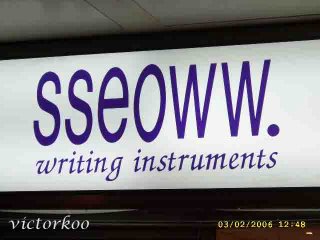 And this one is not even pronounceable. I tried but I sounded like I was spitting:
And this one is not even pronounceable. I tried but I sounded like I was spitting:
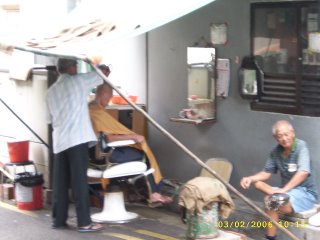 After thinking hard for a solution to the problem for one whole day, I was also back again to try out my new stealth technique of photo-taking. I had set the camera's flash and electronic shutter sound off. I had brought along a mini tripod and was ready to use full telephoto zoom if necessary, i.e. 2.8 x optical coupled with 4 x digital zoom, making a total of 11.2 x zoom. So after I parked my car in the open air car park at Club Street, I proceeded to the battle zone. I found the man lying down at the same spot, clearly exhausted from the previous day's tormenting from me. I also noticed that his set of clothes was the same set as that of the previous day. Maybe he had several sets of the same clothes.
After thinking hard for a solution to the problem for one whole day, I was also back again to try out my new stealth technique of photo-taking. I had set the camera's flash and electronic shutter sound off. I had brought along a mini tripod and was ready to use full telephoto zoom if necessary, i.e. 2.8 x optical coupled with 4 x digital zoom, making a total of 11.2 x zoom. So after I parked my car in the open air car park at Club Street, I proceeded to the battle zone. I found the man lying down at the same spot, clearly exhausted from the previous day's tormenting from me. I also noticed that his set of clothes was the same set as that of the previous day. Maybe he had several sets of the same clothes. Now I have 2 photos of the likely suspect should you suddenly find me dead in the vicinity of Club Street some time soon after. Please lodge a police report for me and show them the 2 photos. Catching the suspect is going to be easy, never mind that the man's face cannot be seen clearly – just look for a man wearing that set of clothes.
Now I have 2 photos of the likely suspect should you suddenly find me dead in the vicinity of Club Street some time soon after. Please lodge a police report for me and show them the 2 photos. Catching the suspect is going to be easy, never mind that the man's face cannot be seen clearly – just look for a man wearing that set of clothes. Nevertheless, I considered that a $30 fine was a small price to pay for my safety. Imagine what could have happened if I had stayed on to watch my car and drink that leisurely cup of tea. The next day's newspaper might just have an article with this catchy title: 'Man Clubbed to Death in Club Street'.
Nevertheless, I considered that a $30 fine was a small price to pay for my safety. Imagine what could have happened if I had stayed on to watch my car and drink that leisurely cup of tea. The next day's newspaper might just have an article with this catchy title: 'Man Clubbed to Death in Club Street'. I have originally intended to use the smiling Buddha's image from my previous post. However Chris warned me against it. Besides being at the likely wrath of the higher forces, I might be guilty of blasphemy or worse, cause a riot that might kill scores of people just like what is happening now elsewhere in the world. I always heed Chris' advice, except the one about not taking people's photo without their permission.
I have originally intended to use the smiling Buddha's image from my previous post. However Chris warned me against it. Besides being at the likely wrath of the higher forces, I might be guilty of blasphemy or worse, cause a riot that might kill scores of people just like what is happening now elsewhere in the world. I always heed Chris' advice, except the one about not taking people's photo without their permission. 






